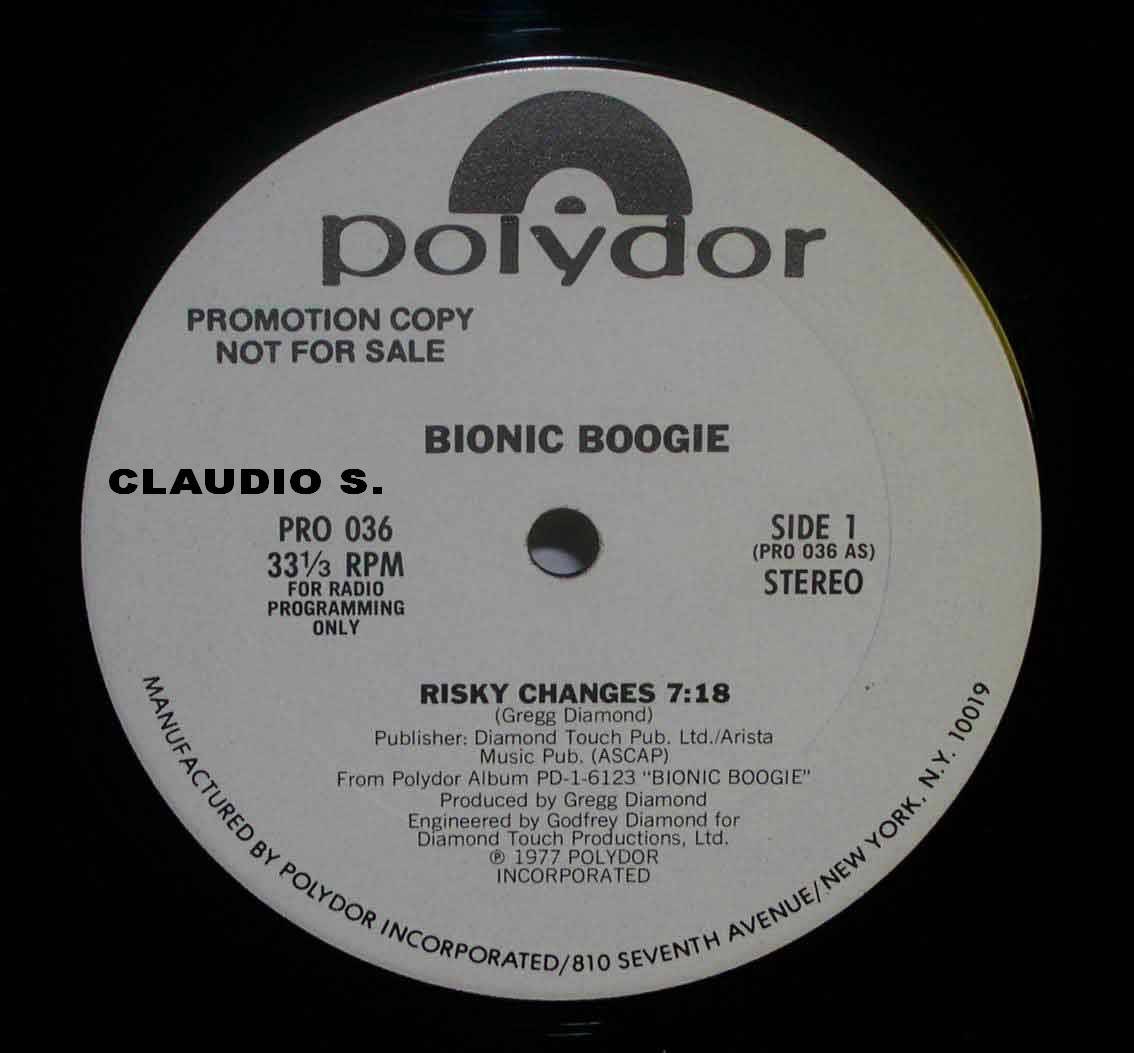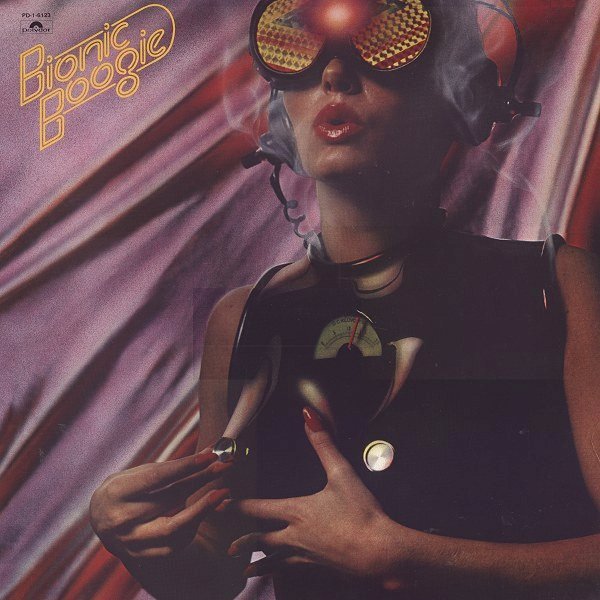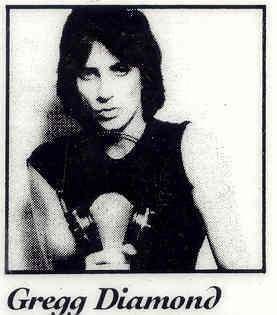BIONIC BOOGIE - S/T: The Right Blend Of Sweet And Street
Producers of disco material did not have it easy during the genre's heyday. Clubgoers and d.j.'s alike expected a steady stream of fresh material to satisfy their demand for variety. Since disco was a producer-driven genre, it fell to the producer to create that material as quickly as possible This material also had to be of a high caliber, delivered with a style and consistency that the listener could rely upon, while also weaving in new innovations that would differentiate itself from the glut of material coming out every week.These demands were a tall order for even the greatest talents and only a select few disco producers managed to score more than a few hits. One of the best was Gregg Diamond, a session musician-turned-producer who released a variety of noteworthy disco releases during the latter part of the 1970's. He had the ear the hooky material that suited itself to singles and 12-inch releases but he was also musically savvy enough to produce the kinds of songs that could sustain an entire long-player. As a result, his material has a strong cult following amongst disco devotees - and the flagship of his musical catalog are the albums he released under the name Bionic Boogie. The first, self-titled Bionic Boogie album was released in 1977. It consolidated the style he began to develop the previous year on the first Andrea True Connection album, a blending of glossy melodies and heart-tugging strings with funky rhythms and punchy horn charts that reflected an urban sensibility. In short, the Bionic Boogie sound was an elegant blend of "sweet" and "street" - and it was tailor-made for the dance floor.The best-remembered items on Bionic Boogie are the two singles, "Dance Little Dreamer" and "Risky Changes." The first is a pop-friendly tale of a young woman who is sustained by her evenings at the discotheque and its sound is a blend elegant, female-led choral vocals, a insistent, pounding beat accentuated by pounding piano lines and plush strings that tug at the listener's emotions. It also boasts a staccato, syncopated bridge with some thrilling and thunderous tympani fills to highlight its drama. The end result sounds like a denser, grittier version of the sound Chic would soon become famous for. "Risky Changes" is a funkier item, with Diamond's Latin-tinged keyboards taking the lead as strings dart in and out of the mix and the singers build a thick web of funky, call-and-response chants. It grooves like mad but has a jazzy, carefully-orchestrated elegance that keeps revealing new frills with each listen.
The first, self-titled Bionic Boogie album was released in 1977. It consolidated the style he began to develop the previous year on the first Andrea True Connection album, a blending of glossy melodies and heart-tugging strings with funky rhythms and punchy horn charts that reflected an urban sensibility. In short, the Bionic Boogie sound was an elegant blend of "sweet" and "street" - and it was tailor-made for the dance floor.The best-remembered items on Bionic Boogie are the two singles, "Dance Little Dreamer" and "Risky Changes." The first is a pop-friendly tale of a young woman who is sustained by her evenings at the discotheque and its sound is a blend elegant, female-led choral vocals, a insistent, pounding beat accentuated by pounding piano lines and plush strings that tug at the listener's emotions. It also boasts a staccato, syncopated bridge with some thrilling and thunderous tympani fills to highlight its drama. The end result sounds like a denser, grittier version of the sound Chic would soon become famous for. "Risky Changes" is a funkier item, with Diamond's Latin-tinged keyboards taking the lead as strings dart in and out of the mix and the singers build a thick web of funky, call-and-response chants. It grooves like mad but has a jazzy, carefully-orchestrated elegance that keeps revealing new frills with each listen. And those singles are merely the first two songs on the album - Bionic Boogie has got plenty more to offer. "Don't Lose That Number" and "We Must Believe In Magic" are surging, high-octane numbers that offset the sing-along hooks of their titles with a frenetic level of energy and sudden sharp-turn shifts in their arrangements that vary the melodic mood while maintaining their intense tempos. "Boogie Boo" and "Stop The Music" have a slinkier, midtempo feel. The lyrics on both play like mantras for the nightclub set: "Boogie Boo" specifically boasts an exhilarating break where the singers declare "We are children of the night/we will carry on until the daylight" (horn arrangements are also stellar on this tune, with a great percussive brass break). The final two numbers, "Feel Like Dancing" and "Big West," omit vocals entirely so the densely-layered strings and Diamond's multi-textured keyboards can carry the melodies. It is to Diamond's credit that his melodic-minded craftsmanship ensures that interest never flags on either.Like the best vintage disco records, Bionic Boogie offers a feast of instrumental textures and shifts in sonic density. Diamond produced the record himself with assistance from his producer brother Godfrey Diamond and the result has a gorgeous, deep sound that yields all manner of details to attentive ears without overwhelming the listener. Tom Moulton
And those singles are merely the first two songs on the album - Bionic Boogie has got plenty more to offer. "Don't Lose That Number" and "We Must Believe In Magic" are surging, high-octane numbers that offset the sing-along hooks of their titles with a frenetic level of energy and sudden sharp-turn shifts in their arrangements that vary the melodic mood while maintaining their intense tempos. "Boogie Boo" and "Stop The Music" have a slinkier, midtempo feel. The lyrics on both play like mantras for the nightclub set: "Boogie Boo" specifically boasts an exhilarating break where the singers declare "We are children of the night/we will carry on until the daylight" (horn arrangements are also stellar on this tune, with a great percussive brass break). The final two numbers, "Feel Like Dancing" and "Big West," omit vocals entirely so the densely-layered strings and Diamond's multi-textured keyboards can carry the melodies. It is to Diamond's credit that his melodic-minded craftsmanship ensures that interest never flags on either.Like the best vintage disco records, Bionic Boogie offers a feast of instrumental textures and shifts in sonic density. Diamond produced the record himself with assistance from his producer brother Godfrey Diamond and the result has a gorgeous, deep sound that yields all manner of details to attentive ears without overwhelming the listener. Tom Moulton  handled the remastering on the Funky Town Grooves reissue CD utilized for this review and it faithfully replicates its classical disco sound, with no unnecessary volume-boosting. Everything has room to breathe and it sounds great when you crank up the volume. This new disc also boasts the original remixes for "Dance Little Dreamer" and "Risky Changes": both are subtle extensions of the album-length cuts but "Risky Changes" pushes up the bass and drums in the mix to give it a more beat-driven club sound.To sum up, Bionic Boogie is a disco album whose musicality sustains it from the first cut to the last - and it is thus a great testament to Gregg Diamond's skills. Disco fans looking to explore l.p.-length ventures in this style will want to include it on their shopping list.
handled the remastering on the Funky Town Grooves reissue CD utilized for this review and it faithfully replicates its classical disco sound, with no unnecessary volume-boosting. Everything has room to breathe and it sounds great when you crank up the volume. This new disc also boasts the original remixes for "Dance Little Dreamer" and "Risky Changes": both are subtle extensions of the album-length cuts but "Risky Changes" pushes up the bass and drums in the mix to give it a more beat-driven club sound.To sum up, Bionic Boogie is a disco album whose musicality sustains it from the first cut to the last - and it is thus a great testament to Gregg Diamond's skills. Disco fans looking to explore l.p.-length ventures in this style will want to include it on their shopping list.


